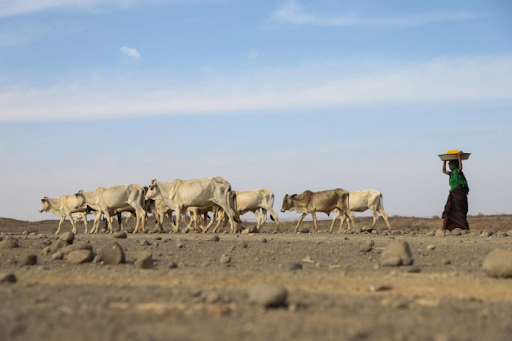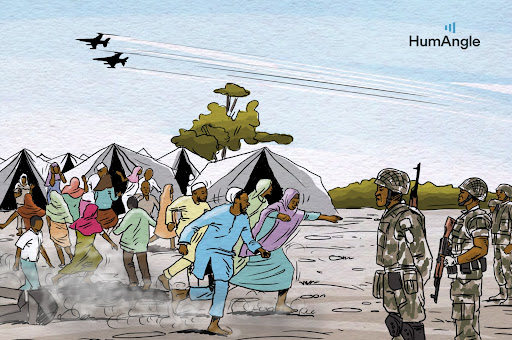Drought Pushes 13 Million People Into Hunger In Horn of Africa — WFP
Amid worsening levels of hunger caused by drought in the Horn of Africa, humanitarians are calling on African leaders to develop national agricultural investment plans (climate-proof) and ensure humanitarian access to those most in need.

Severe drought has left an estimated 13 million people facing severe hunger in the Horn of Africa, according to the United Nations World Food Program (WFP).
Three failed rainy seasons have devastated livestock and crops in driest conditions recorded in Somalia, Ethiopia, and Kenya since 1981, the WFP said in a statement on Tuesday, Feb. 8.
The agency said the drought has impacted pastoral and farmer populations across southern and southeastern Ethiopia, southeastern and northern Kenya, and south-central Somalia where shortages of water and pasture are forcing families from their homes and leading to increased communal conflicts.
“Harvests are ruined, livestock are dying, and hunger is growing as recurrent droughts affect the Horn of Africa,” said Michael Dunford, Regional Director in the WFP Regional Bureau for Eastern Africa, adding that more forecasts of below-average rainfall threaten to worsen conditions in the coming months.
“The situation requires immediate humanitarian action and consistent support to build the resilience of communities for the future.”
WFP said it needs $327 million to look after the urgent needs of 4.5 million people over the next six months and help communities become more resilient to extreme climate shocks.
The need for aid adds to the plight of the people in the region who are already facing increasing food prices, inflation and low demand for agricultural labour amid high rates of malnutrition and armed conflicts.
In Ethiopia, for instance, an estimated 5.7 million people affected by severe drought need food assistance, according to the agency.
The large bulk of the population is from war-torn Tigray in the Northeast region where almost 40 per cent of the six million people are facing food shortage as a result of the ongoing civil war, compounded by aid blockade in the region.

In neighbouring Somalia, more than 4.6 million people need urgent assistance between February and May, according to the agency. While in Kenya, 2.8 million people are in need of food assistance.
Early warning of serious humanitarian crisis
Before the WFP report, other humanitarian agencies had raised alarm over the fragile state of the region. Earlier in February, the UN Food and Agricultural Organisation (FAO), in its 2022 Humanitarian Response Plan, projected that some 25.3 million people would face “high acute food insecurity” by the middle of the year.
It feared that a large-scale hunger crisis could break out if food-producing rural communities do not receive adequate assistance timed to the needs of the upcoming agricultural seasons.

Generally, across Africa, social injustice and inequality have contributed to extremist violence, leaving many displaced in poorer conditions and national economies indebted, and threatening sustainable development in the continent.
With the latest addition of climate change effects in the continent, humanitarians are calling on African leaders to make better, more effective use of all existing mechanisms they have to prevent and resolve conflicts and food shortage rather than being over-dependent on foreign aid.
For instance, when the African Union leaders held its yearly summit in Addis Ababa, Ethiopia, the hunger crisis in the conflict-ridden Tigray region was not directly addressed, despite launching a “year of nutrition” plan, according to DW. DW quoted Bankole Adeoye, the AU Commissioner for Political Affairs, Peace and Security (PAPS) as reiterating the bloc’s call for “guaranteed humanitarian access to the areas in need.”
Oxfam, a UK-based aid group, earlier called on African governments to boost funding for agriculture, address peace and security challenges, and do more to genuinely tackle inequality.
“While the deck seems stacked against Africa, there is a lot more that African leaders can do to improve food security. Instead of allocating 15 per cent of national budgets to the health sector and 10 per cent to agriculture, military spending across Africa rose by over 5 per cent in 2020,” said Oxfam’s Pan-African Program Director Peter Kamalingin.
“African leaders must prioritise food, trade and medicines over bullets, guns and bombs. People are having to skip meals to feed their children, selling livestock and other assets, begging, pulling children out of school.”
Support Our Journalism
There are millions of ordinary people affected by conflict in Africa whose stories are missing in the mainstream media. HumAngle is determined to tell those challenging and under-reported stories, hoping that the people impacted by these conflicts will find the safety and security they deserve.
To ensure that we continue to provide public service coverage, we have a small favour to ask you. We want you to be part of our journalistic endeavour by contributing a token to us.
Your donation will further promote a robust, free, and independent media.
Donate HereStay Closer To The Stories That Matter




